Let’s Talk About Reparations – (Part 3 of 3)
Global Reparations Movement – Strength in Numbers
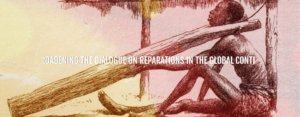
Recap Summaries from Parts 1 & 2
The last two podcasts explored different perspectives of the topic of various countries who were involved in the slave trade of history, with all the suffering and inhumane treatment of certain groups of society that took place, and was very much part of the fabric of those nations. Reparations for the countries and its people who suffered in the clutches of this vile process, has long since been an issue for those countries who suffered economically and who were made to continue suffering for years afterwards, whilst those nations who were responsible for the cruelty to people and the pillaging of artifacts and resources from those poorer nations, continued to become rich in resources that did not belong to them in the first place.
Summary of Part 1:- Let’s Talk About Reparations – Sorrow & Regret Are Not Enough
We looked at definitions of Reparations and the general summary of the dictionary definition came down to this:-
“The payment of damages – Indemnification”
Bristol and Transatlantic Slavery
“What was Britain’s role? Who was involved, what was bought and sold, who stopped it, and what is the effect of the trade today?”
Slavery Routes
- From Bristol to Africa
- Bristol developed into one of the major trading ports in Britain. From at least the 14th century, Bristol was the second English city after London.
- From Africa to America
- Many British ships made the journey to West Africa to trade for enslaved African people. Once on board, the enslaved Africans would be taken across the Atlantic Ocean to the Americas where they would be sold to the plantation owners who needed them to work on the plantations there. The ships would then load up with new cargo for the last leg of the journey back to Britain.
- From America to Bristol
- The last leg of the triangular trade was the return back to Bristol, this is known as the ‘return passage’ . The slave ships would have left Bristol many months before for West Africa.
- The Places Involved
- Africa was the source for the millions of slaves shipped across the Atlantic Ocean between the 15th and the 19th centuries. It was also the source for slaves who were shipped north and east to the Arab world from the 7th century. Europeans rarely went further into Africa than the coastal areas.
- Before the Europeans even knew of Africa, it was a rich and varied continent with many different cultures and civilisations.
- Art Culture and Technology:- West African craftspeople produced a wide range of sophisticated items. Brass objects were made by the brassworkers’ guild in the city of Benin, part of what is today Nigeria. Guilds were professional bodies set up for different craftspeople.
- Europe:- Many port towns and cities around Europe joined in the transatlantic slave trade
- The slave trade was dominated by three main players. France, Britain and Portugal were the major slave trading nations. Spain was a major user of slave labour in its Caribbean and South American colonies .
- With acknowledgement to the work by Nigel Tattersfield on the Slave Trade from the minor ports of England.
- West Indies:- From 1492 the islands and the east coast of mainland America were settled by Europeans. They were farming the land, growing crops at first for food, then later for luxury crops to be sold. On the islands, the local people were made to work the land by the invading Europeans.
- In 1639 there were 1,000 Africans on the Caribbean island of Barbados.
- South Americas:- When people talk or write about the transatlantic slave trade , they usually concentrate on what happened in the Caribbean and North America. Usually Central and South America are not included in the story, even though they were involved. Europeans colonised what are known as the Americas. The continent includes the Caribbean, Canada, the USA, and the central and South American countries such as Mexico and Brazil. A mixture of English, French, Spanish and Portugese people travelled across the Atlantic Ocean to settle in the many parts of the Americas.
- The East Indies:- After arriving in Africa, the Americas and Asia, European powers wanted to own, or colonise , them. These new continents offered wealth and power to the European countries. Vast areas of the world were divided up and fought over by the Europeans. Britain owned parts of America and the Caribbean, and had strong links with numerous places in Africa and Asia.
- Bristol:- At the beginning of the 18th century, Bristol was the second most important port in the country after London, and the third largest city.
The People Involved
- Enslaved People
- Traders, Merchants, and Planters
- Sailors
The debate about reparations has, conveniently, been branded extreme and unrealistic by those who don’t want to pay them.
We happily listen to the heir to the throne – who on Windrush Day said Britain owed a “debt of gratitude” to the people of the Caribbean – while ignoring the reality that what Britain owes is, in fact, a straight-up financial debt.
The case is unequivocal. The African American intellectual WEB Du Bois was right when he described the enslavement of at least 12 million Africans as “the sum of all villainies, the cause of all sorrow, the root of all prejudice”.
In the Caribbean, Britain received, in the words of Nobel prize-winning economist Arthur Lewis, 200 years of free labour – from over 15 million black people, and those who were indentured from India.
The Global Movement Approach
In this 3rd and final part of this series we will look at the Global Movement Approach to seeking Reparation. It is growing movement and from my brief foray into this subject, a global approach seems to be stronger and the likelihood of success higher. The alternative is to coral the individual groups seeking reparation to the whim and control of the governing bodies in each of their respective countries. The UK is I am sure replicating the standard classic responses it gives to such matters. Express regret, and contort their expressions into one that is meant to replicate interest and sorrow, and then the aristocrat concerned returns to their homes and businesses that many of them acquired on the backs of slaves.
How Slavery Helped Build a World Economy
The slavery system in the United States was a national system that touched the very core of its economic and political life. (source: National Geographic) published in January 2003.
“African people were captured and transported to the Americas to work. Most European colonial economies in the Americas from the 16th through the 19th century were dependent on enslaved African labour for their survival.
According to European colonial officials the abundant land they had “discovered” in the Americas was useless without sufficient labour to exploit it. Slavery systems of labour exploitation were preferred but neither European nor Native American sources proved adequate to the task.”
“of the 6.5 million immigrants who survived the crossing of the Atlantic and settled in the Western Hemisphere between 1492 and 1776, only 1 million were European. The remaining 5.5 million were African.”
So much more information on how the World benefited from Slavery, some of which is contained in the links at the end of the article. I have included the links from parts one and two as well. This leads into Part 3 of this series, in terms of individual nations arguing/pleading their case to their respective governments or a Global Movement for global requests for reparation, as the world benefited in a variety of ways economically, not just the nations mentioned in this series of podcast owning Plantations and Slaves, but who they traded with, and the industries which developed in the chain leading back to the vessels travelling the seas and the various landing points where plantations were developed etc.
Coercion and forced assimilation often accompanied those gains and scholars still debate colonialism many legacies. Colonialism impacts include environmental degradation, the spread of disease, economic instability, ethnic rivalries and human rights violations – issues that can long outlast one groups colonial rule.
How should reparations be defined? Global Movement Approach
It is argued by some professionals and researchers that reparations should not only be defined in terms of “financial compensation” but should additionally include various types of systemic change that focus on physical and psychological harms.
- While reparations advocacy has been around in one form or another for more than a century, the newer, more global movement comes as an era of globalization has helped bring once disjointed parts of the African diaspora into a more universal fight for reparations for the descendants of enslaved people.
The case for British slavery reparations can no longer be ignored
CARICOM
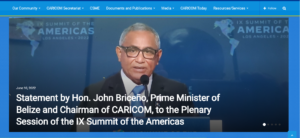
 Dr Carla Barnet – Sec General
Dr Carla Barnet – Sec General
CARICOM:- is the oldest surviving integration movement in the developing world. It is a grouping of 20 countries: 15 member states and 5 Associate members
- Its Mandate is:-to promote and support a unified Caribbean community that is inclusive, resilient, competitive: sharing in economic, social and cultural prosperity.
Extracts from a presentation delivered in September 2020, looking at global models of seeking reparations, as opposed to individual groups and organisations to try and make a case relative to their own country. Reparation discussions, if they ever got that far, would be between the government of the day and entities set up to continue to argue their case with their government in power. If any deal was ever reached in the future, it would be between those two groups in respect of a particular country. The potential for types and amounts of reparation could vary enormously, dependant upon the country and its citizens.
The Global Reparations Movement is advocating in a very different way. It looks at slavery as being a world issue, not just an issue for where slaves were placed. It is regarded as a world issue because the world benefited from slavery in some way, whether or not they had slaves working in their countries. It has been said many times already in the limited research I could do for this topic, that if the same atrocities occurred today, it would be classed as genocide and a serious breach in human rights on a global scale. This movement and its linked groups believe that there is more chance of breakthrough by using a global approach, not placing the responsibility solely on individual countries and their governments.
- I would use the analogy of an individual worker trying to argue their case with their employer, about one or more aspects of the conditions of employment. Another employee working in a different organisation, may have similar concerns, but the outcomes of both experiences has the risk of being entirely different. Employee representation and professional bodies carry more weight, as national bodies representing workforces in similar categories and grades, and therefore any agreement reached applies to everyone in that industry countrywide.
- International Human Rights Act applies across the board to all countries who sign up to it, and for those who have not, the fact that an international forum exists, is still a plus for everyone.
In the Presentation mentioned earlier, it highlighted a 10 point plan/structure relating to factors which would be integral to universal coverage and debates around universal payouts of reparation.
Broadening the Dialogue on Reparations in The Global Context. The Presentation was delivered by Earl Bouquet (Chairman of the Saint Lucia National Reparations Committee – NRC ) and Member of CARICOM Reparations Commission (CRC)
The venue for this presentation and its audience was Yale University.
OECS :- Organisation of Eastern Caribbean States.
You Tube Link re the 10 Point Plan: https://youtu.be/6uOlEpfsPB0
- FULL FORMAL APOLOGY
The healing process for victims and the descendants of the enslaved and enslavers requires as a precondition the offer of a sincere formal apology by the governments of Europe. Some governments in refusing to offer an apology have issued in place Statements of Regrets.
Such statements do not acknowledge that crimes have been committed and represent a refusal to take responsibility for such crimes. Statements of regrets represent, furthermore, a reprehensible response to the call for apology in that they suggest that victims and their descendants are not worthy of an apology. Only an explicit formal apology will suffice within the context of the CRJP.
- REPATRIATION
Over 10 million Africans were stolen from their homes and forcefully transported to the Caribbean as the enslaved chattel and property of Europeans. The transatlantic slave trade is the largest forced migration in human history and has no parallel in terms of man’s inhumanity to man.
This trade in enchained bodies was a highly successful commercial business for the nations of Europe. The lives of millions of men, women and children were destroyed in search of profit. The descendants of these stolen people have a legal right to return to their homeland.
A Repatriation program must be established and all available channels of international law and diplomacy used to resettle those persons who wish to return. A resettlement program should address such matters as citizenship and deploy available best practices in respect of community re-integration.
- INDIGENOUS PEOPLES DEVELOPMENT PROGRAM
The governments of Europe committed genocide upon the native Caribbean population. Military commanders were given official instructions by their governments to eliminate these communities and to remove those who survive pogroms from the region.
Genocide and land appropriation went hand in hand. A community of over 3,000,000 in 1700 has been reduced to less than 30,000 in 2000. Survivors remain traumatized, landless, and are the most marginalized social group within the region.
The University of the West Indies offers an Indigenous Peoples Scholarship in a desperate effort at rehabilitation. It is woefully insufficient. A Development Plan is required to rehabilitate this community.
- CULTURAL INSTITUTIONS
European nations have invested in the development of community institutions such as museums and research centres in order to prepare their citizens for an understanding of these CAH.
These facilities serve to reinforce within the consciousness of their citizens an understanding of their role in history as rulers and change agents.
There are no such institutions in the Caribbean where the CAH were committed. Caribbean schoolteachers and researchers do not have the same opportunity.
Descendants of these CAH continue to suffer the disdain of having no relevant institutional systems through which their experience can be scientifically told. This crisis must be remedies within the CRJP.
- PUBLIC HEALTH CRISIS
The African descended population in the Caribbean has the highest incidence in the world of chronic diseases in the forms of hypertension and type two diabetes.
This pandemic is the direct result of the nutritional experience, physical and emotional brutality, and overall stress profiles associated with slavery, genocide, and apartheid. Over 10 million Africans were imported into the Caribbean during the 400 years of slavery.
At the end of slavery in the late 19th century less than 2 million remained. The chronic health condition of Caribbean blacks now constitutes the greatest financial risk to sustainability in the region. Arresting this pandemic requires the injection of science, technology, and capital beyond the capacity of the region.
Europe has a responsibility to participate in the alleviation of this heath disaster. The CRJP addresses this issue and calls upon the governments of Europe to take responsibility for this tragic human legacy of slavery and colonisation.
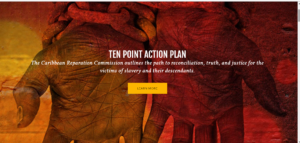
- ILLITERACY ERADICATION
At the end of the European colonial period in most parts of the Caribbean, the British in particular left the black and indigenous communities in a general state of illiteracy. Some 70 percent of blacks in British colonies were functionally illiterate in the 1960s when nation states began to appear.
Jamaica, the largest such community, was home to the largest number of such citizens. Widespread illiteracy has subverted the development efforts of these nation states and represents a drag upon social and economic advancement.
Caribbean governments allocate more than 70 percent of public expenditure to health and education in an effort to uproot the legacies of slavery and colonization. European governments have a responsibility to participate in this effort within the context of the CRJP.
- AFRICAN KNOWLEDGE PROGRAM
The forced separation of Africans from their homeland has resulted in cultural and social alienation from identity and existential belonging. Denied the right in law to life, and divorced by space from the source of historic self, Africans have craved the right to return and knowledge of the route to roots.
A program of action is required to build ‘bridges of belonging’. Such projects as school exchanges and culture tours, community artistic and performance programs, entrepreneurial and religious engagements, as well as political interaction, are required in order to neutralize the void created by slave voyages.
Such actions will serve to build knowledge networks that are necessary for community rehabilitation.
- PSYCHOLOGICAL REHABILITATION
For over 400 years Africans and their descendants were classified in law as non-human, chattel, property, and real estate. They were denied recognition as members of the human family by laws derived from the parliaments and palaces of Europe.
This history has inflicted massive psychological trauma upon African descendant populations. This much is evident daily in the Caribbean.
Only a reparatory justice approach to truth and educational exposure can begin the process of healing and repair. Such an engagement will call into being, for example, the need for greater Caribbean integration designed to enable the coming together of the fragmented community.
- TECHNOLOGY TRANSFER
For 400 years the trade and production policies of Europe could be summed up in the British slogan: “not a nail is to be made in the colonies”.
The Caribbean was denied participation in Europe’s industrialization process, and was confined to the role of producer and exporter of raw materials. This system was designed to extract maximum value from the region and to enable maximum wealth accumulation in Europe.
The effectiveness of this policy meant that the Caribbean entered its nation building phase as a technologically and scientifically ill-equipped- backward space within the postmodern world economy.
Generations of Caribbean youth, as a consequence, have been denied membership and access to the science and technology culture that is the world’s youth patrimony. Technology transfer and science sharing for development must be a part of the CRJP.
- DEBT CANCELLATION
Caribbean governments that emerged from slavery and colonialism have inherited the massive crisis of community poverty and institutional unpreparedness for development. These governments still daily engage in the business of cleaning up the colonial mess in order to prepare for development.
The pressure of development has driven governments to carry the burden of public employment and social policies designed to confront colonial legacies. This process has resulted in states accumulating unsustainable levels of public debt that now constitute their fiscal entrapment.
This debt cycle properly belongs to the imperial governments who have made no sustained attempt to deal with debilitating colonial legacies. Support for the payment of domestic debt and cancellation of international debt are necessary reparatory actions.
There will be a follow up on this topic later in the year. For now, I hope you have found this series interesting and informative, and more than anything, I hope you go on to explore and research topics related to this subject in the future. Hopefully, the few links here are a good starting point to choose from.
Image Gallery:-
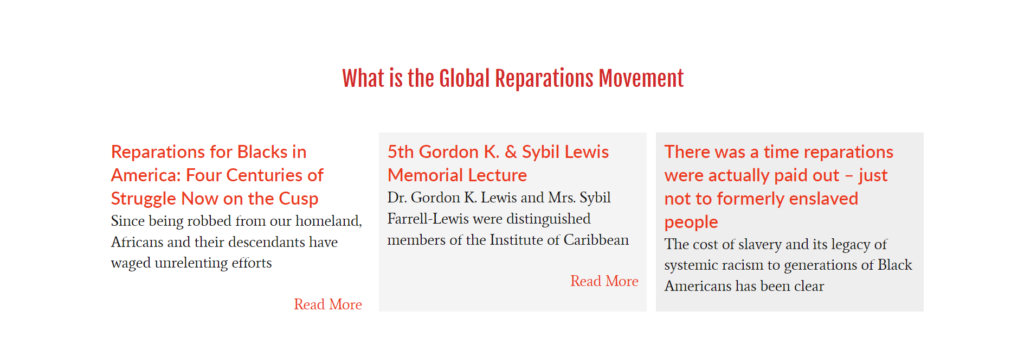
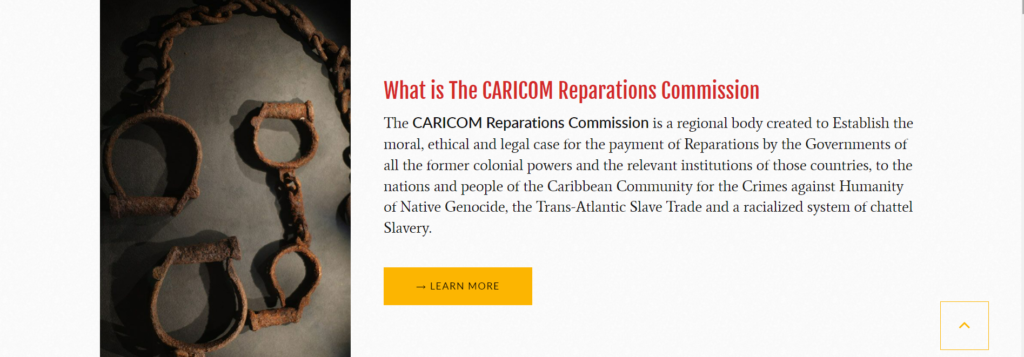
Member States and Associate Members – CARICOM
https://caricom.org/member-states-and-associate-members
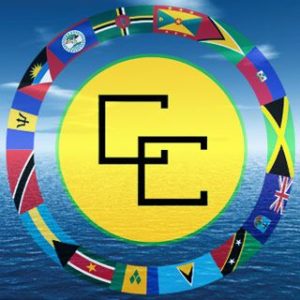
Ivy Barrow
12th June 2022
Reference Sources linked but not exclusively to Part 1 of this Series of 3
https://taxjustice.net/2020/06/09/slavery-compensation-uk-questions/
https://www.antislavery.org/britain-apologise-pay-reparations-past-slavery/
https://inews.co.uk/news/slavery-reparations-uk-range-apology-to-payout-1547106
https://www.clasp.org/blog/debt-be-paid-reparations-and-new-deal-youth/
https://thehill.com/opinion/civil-rights/540812-slavery-reparations-are-a-divisive-waste-of-time/
https://www.procon.org/headlines/reparations-for-slavery-top-3-pros-and-cons/
https://www.africanamerica.org/topic/reparations-for-descendants-of-american-slavery
https://wmpeople.wm.edu/asset/index/cvance/reparations
https://www.theguardian.com/world/2015/sep/30/british-slavery-reparations-qa
-
- P.R. Lockhart, NBC News Dec 26 2021 – Calls for reparations are as old as emancipation. Will global powers finally listen?
https://news.yahoo.com/researcher-dreisen-heath-calls-multifaceted-123906886.html?fr=sycsrp_catchall
https://en.wikipedia.org/wiki/Slavery_in_Britain
https://en.wikipedia.org/wiki/Slavery
https://en.wikipedia.org/wiki/Slavery_at_common_law
https://en.wikipedia.org/wiki/Slavery_Abolition_Act_1833
https://spartacus-educational.com/slavery.htm
Reference Sources linked to but not exclusively to Part 2 of 3
The past is still present: why colonialism deserves better coverage – The Correspondent by Elliott Ross on 9th October 2019
Everyday Colonialism – The Correspondent
https://api.nationalgeographic.com What is Colonialism?
https://reparationscomm.org Article by Webmaster October 7th 2021
https://ibw21.org Reparations are a Human Right. The 21st Century Reparation Paradigm
https://commonwealthroundtable.co.uk
https://theguardian.com Article dated 29th March 2022 by Kenneth Mohammed
https://nationalgeographic.com How slavery helped Build a World Economy. Published Jan 3rd 2003
Reference Sources linked to but not exclusively to Part 3 of 3
Global models for questions of reparations | The MacMillan Center (yale.edu)
https://www.oxfordbibliographies.com/view/document/obo-9780199796953/obo-9780199796953-0003.xml
https://www.hrw.org/news/2001/07/19/approach-reparations
https://caricomreparations.org/broadening-the-dialogue-on-reparations-in-the-global-context/
https://reparationscomm.org/reparations-news/expanding-the-global-reparations-movement/
https://www.discoveringbristol.org.uk/slavery/routes/
https://www.discoveringbristol.org.uk/slavery/routes/from-africa-to-america/
https://www.discoveringbristol.org.uk/slavery/routes/america-to-bristol/
https://www.discoveringbristol.org.uk/slavery/routes/places-involved/
https://blackeconomics.co.uk/2020/07/27/reparations-and-black-americans-attitudes-about-race/
https://blackhammer.org/reparations/
https://marketingthesocialgood.com/2020/06/23/reparations-for-racism-a-social-goods-approach/
https://blacksourcemedia.com/reparations-for-african-americans-in-new-orleans/
https://www.bbc.co.uk/newsround/53531055
https://www.hrw.org/news/2001/07/19/approach-reparations
https://caricomreparations.org/broadening-the-dialogue-on-reparations-in-the-global-context/
https://www.oxfordbibliographies.com/view/document/obo-9780199796953/obo-9780199796953-0003.xml
https://reparationscomm.org/reparations-news/expanding-the-global-reparations-movement/
Reference Sources
https://taxjustice.net/2020/06/09/slavery-compensation-uk-questions/
https://www.antislavery.org/britain-apologise-pay-reparations-past-slavery/
https://inews.co.uk/news/slavery-reparations-uk-range-apology-to-payout-1547106
https://www.clasp.org/blog/debt-be-paid-reparations-and-new-deal-youth/
https://thehill.com/opinion/civil-rights/540812-slavery-reparations-are-a-divisive-waste-of-time/
https://www.procon.org/headlines/reparations-for-slavery-top-3-pros-and-cons/
https://www.africanamerica.org/topic/reparations-for-descendants-of-american-slavery
https://wmpeople.wm.edu/asset/index/cvance/reparations
https://www.theguardian.com/world/2015/sep/30/british-slavery-reparations-qa
-
- P.R. Lockhart, NBC News Dec 26 2021 – Calls for reparations are as old as emancipation. Will global powers finally listen?
https://news.yahoo.com/researcher-dreisen-heath-calls-multifaceted-123906886.html?fr=sycsrp_catchall
https://en.wikipedia.org/wiki/Slavery_in_Britain
https://en.wikipedia.org/wiki/Slavery
https://en.wikipedia.org/wiki/Slavery_at_common_law
https://en.wikipedia.org/wiki/Slavery_Abolition_Act_1833
https://spartacus-educational.com/slavery.htm